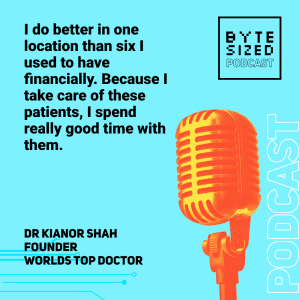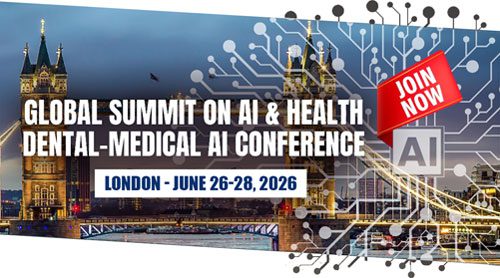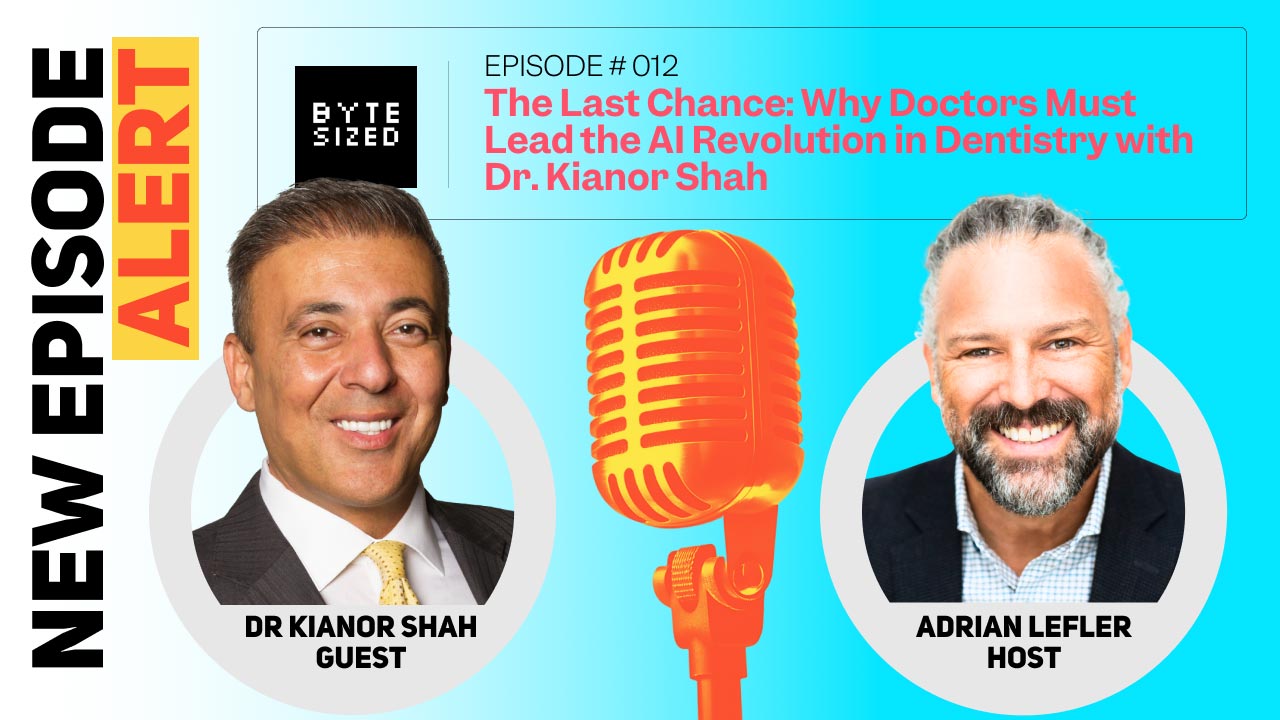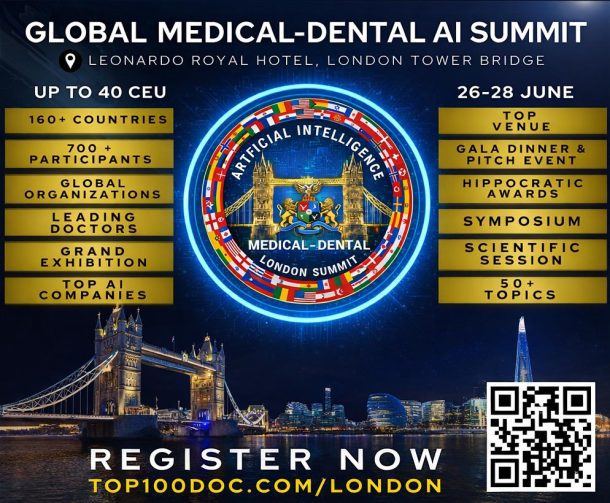When Adrian Lefler invited me to share my story on the Byte Sized Podcast, I knew we were going to dive deep into some unconventional territory. Most dentists wouldn’t understand why someone would sell six successful practices to focus on just one, or why a practicing dentist would spend his profits organizing global healthcare summits. But after our conversation, I realized that my journey represents something bigger than personal success—it’s about leading global healthcare initiatives that healthcare desperately needs.
The Counterintuitive Path: Why Less Became More
Adrian asked me about my decision to go from six dental locations to one, and I’ll be honest—it sounds crazy to most people in our industry. “I did at some point have six locations,” I explained to Adrian. “I gave up those six locations. I started focusing just on one. It was one of those mistakes that you make. Medicine is, you know, we all have a good living, you make a good living, everybody’s fed, you have investments, you have homes. I do better in one location than six I used to have financially because I take care of these patients, I spend really good time with them.”
 The math might seem backwards, but here’s what I learned: when you’re managing multiple locations, you’re essentially running a real estate business, not a dental practice. You’re dealing with HR nightmares, quality control issues across different sites, and spending more time putting out fires than actually practicing dentistry. Your patients become numbers instead of people you genuinely care about.
The math might seem backwards, but here’s what I learned: when you’re managing multiple locations, you’re essentially running a real estate business, not a dental practice. You’re dealing with HR nightmares, quality control issues across different sites, and spending more time putting out fires than actually practicing dentistry. Your patients become numbers instead of people you genuinely care about.
At Desert Dream Dentistry & Spa, my single practice in Southern California, I work just two to three days per week. We focus on complex cases that other practices can’t handle—full-mouth rehabilitations, patients with severe anxiety, cases that require our team of specialists including oral surgeons, anesthesiologists, and endodontists. These six to seven-hour procedures that transform someone’s life are infinitely more rewarding than cramming twenty routine cleanings into a day.
The financial results speak for themselves. This one focused practice generates enough revenue to fund all my global healthcare initiatives while providing excellent compensation for my specialized team. Quality over quantity isn’t just a nice philosophy: it’s a profitable business strategy.
Building Something Bigger: The Global Summits Institute
During our conversation, Adrian seemed genuinely intrigued by my work beyond the operatory. The Global Summits Institute, which I founded and self-fund through my practice revenue, connects over 1,000 doctors across 160 countries. When I explained the mission to Adrian, I talked about what drove me to create this network.
“In dental school, I learned all these things about ethics and benevolence and doctrines of medicine and beneficence and doing no harm,” I shared. “And then I get out in the private sector and I start seeing all this stuff going on that’s very questionable. So I thought the way we’re gonna restore order back to the Hippocratic origins is by bringing in the best of the best from all over the world.”
What makes our summits different is that they’re entirely self-funded: no pharmaceutical sponsors, no device company agendas. Just healthcare professionals committed to elevating our field through ethical practice and innovation. We focus on bringing together doctors who have made significant contributions through clinical excellence, education, or leadership.
The AI Challenge: Healthcare’s Wild West Moment
The most important topic Adrian and I discussed was probably the most urgent: artificial intelligence in healthcare. I’m organizing the Global Consensus Summit on AI for London in 2026, and this represents something that’s never been attempted before—creating comprehensive ethical frameworks and regulatory guidelines for AI in healthcare.
 Right now, AI development in healthcare is like the wild west. “There’s nothing out there from stopping anybody from creating a software product and starting to sell it and completely bypassing HIPAA regulations, encryption, cyber security issues,” I told Adrian. Recent controversies, like the class-action lawsuit against Heartland Dental for allegedly using patient conversations to train AI systems without proper consent, prove we can’t wait for someone else to figure this out.
Right now, AI development in healthcare is like the wild west. “There’s nothing out there from stopping anybody from creating a software product and starting to sell it and completely bypassing HIPAA regulations, encryption, cyber security issues,” I told Adrian. Recent controversies, like the class-action lawsuit against Heartland Dental for allegedly using patient conversations to train AI systems without proper consent, prove we can’t wait for someone else to figure this out.
Here’s what I believe: AI must be led by doctors and healthcare providers because we have the most invested in patient outcomes and safety. Tech companies are motivated by profit. Government regulators are concerned with broad policy. But we practitioners understand the nuances of patient care and the sacred nature of the doctor-patient relationship.
The London summit will bring together government officials, potential royalty from Britain and Saudi Arabia, healthcare providers, and support staff to create what I call “the Hippocratic seal”: a certification process that thoroughly vets AI companies and establishes ethical guidelines for their products. This isn’t about slowing down innovation; it’s about ensuring that innovation serves patients rather than exploiting them.
Lessons from an Unconventional Journey
Adrian’s questions got me reflecting on what I’ve learned that might help other healthcare providers navigate this changing landscape. First, don’t confuse growth with success. The pressure to expand, see more patients, and increase revenue can actually distance you from what drew you to healthcare in the first place—helping people.
Second, your clinical success can fund bigger ambitions. Instead of just accumulating wealth, consider how you can use your prosperity to improve your profession. My practice’s profitability enables the Global Summits Institute’s work across 160 countries. That creates legacy value that extends far beyond personal financial success.
Third, networking isn’t about collecting business cards at conferences. It’s about building genuine relationships based on shared values. The Global Summits Institute shows how professional connections can evolve into collaborative community building that elevates entire industries. Effective dental marketing strategies often follow the same principle—building authentic relationships rather than transactional interactions.
The Call to Action
As Adrian and I wrapped up our conversation, I emphasized that this isn’t just about me or my initiatives. We as doctors can’t preserve the patient-doctor relationship alone, but together, with the right community and shared commitment to ethical practice, we can shape healthcare’s future.
The invitation to our London AI summit extends beyond attending another continuing education event. It’s a call for healthcare professionals to take active roles in determining our industry’s direction. If we don’t lead these conversations about AI ethics and implementation, others will make those decisions for us—and they might not have our patients’ best interests at heart.
I’m grateful to Adrian for giving me a platform to share these ideas on Byte Sized. The podcast reaches dental professionals who are thinking beyond their immediate practices, who understand that our individual success is connected to our profession’s integrity and future.
If you’re interested in joining this conversation, I encourage you to listen to the full episode and consider how you might contribute to the changes healthcare needs. Whether it’s through the Global Summits Institute, implementing ethical AI practices in your own practice, or simply maintaining the Hippocratic principles that drew you to healthcare, every action matters.
Together, we can ensure that healthcare’s future honors both innovation and the timeless values of patient care that define our calling.
Frequently Asked Questions
How does the Global Summits Institute differ from traditional medical conferences?
Traditional medical conferences are often sponsored by pharmaceutical companies or device manufacturers, which can influence the agenda and content. The Global Summits Institute is entirely self-funded, meaning we have no external sponsors dictating our discussions. We focus exclusively on ethical practice, clinical excellence, and genuine innovation rather than product promotion. Our events are invitation-only, bringing together carefully vetted healthcare leaders who have demonstrated commitment to the Hippocratic principles rather than just commercial success.
What specific qualifications does the Global Summits Institute look for in members?
We prioritize character over credentials. While we certainly have members with impressive academic backgrounds, we’re more interested in doctors who demonstrate moral fiber, ethical leadership, and a genuine commitment to improving healthcare. Our committee of regents reviews each application looking for evidence of community service, ethical practice, mentorship of other healthcare providers, or innovative contributions to patient care. Age and years of practice matter less than mindset and values.
What will be unique about the London AI Consensus Summit compared to other AI conferences?
Most AI conferences focus on technology capabilities or business applications. Our London summit will be the first to bring together government officials, healthcare providers, and potentially royal family members to establish comprehensive ethical frameworks for healthcare AI. We’re creating the “Hippocratic seal”—a certification process that thoroughly vets AI companies before they can market to healthcare providers. This isn’t just another continuing education event; it’s about establishing global standards for AI tools serve patient interests rather than corporate profits.
How can practicing dentists stay current with AI development in healthcare without getting overwhelmed?
Start by understanding the fundamental question: does this AI tool serve my patients or the company selling it? Focus on solutions that enhance the doctor-patient relationship rather than replacing human judgment. Join professional networks like the Global Summits Institute where these topics are discussed from a clinical perspective rather than a sales pitch. Most importantly, demand transparency from AI vendors about data usage, privacy protection, and decision-making algorithms before implementing any technology in your practice.
What advice would you give to dentists considering major career pivots or unconventional paths?
Don’t let others define success for you. The dental industry often equates success with number of locations, patient volume, or revenue growth. But true success comes from alignment between your values and your daily work. If you’re passionate about education, research, or healthcare policy, find ways to pursue those interests alongside or instead of traditional practice expansion. Your clinical skills and business success can fund bigger ambitions that create lasting impact beyond just personal wealth accumulation.



